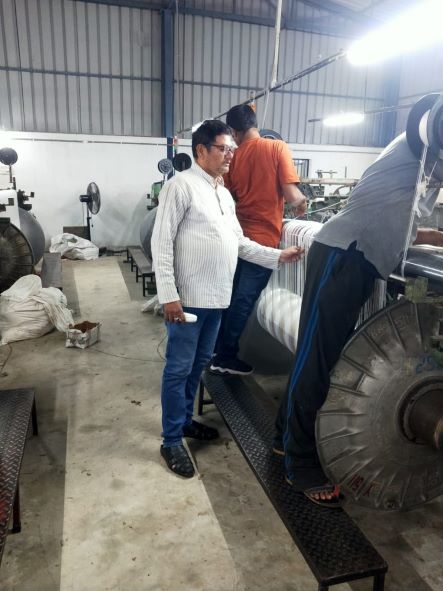Factory Worker Weaves Hope For Surat Migrant Labourers, Sets Up Textile Mill In Odisha’s Ganjam

Berhampur: For an estimated 8 lakh Odia migrants working in textile mills of Surat in Gujarat, Sisir Gouda of Balakrushnapur in Odisha’s Ganjam district has emerged a beacon of hope.
weaved a new hope for the migrant workers who are eager to return to Ganjam from Surat and put a break on the exodus of workers from Ganjam.
Sisir, who worked in textile mills at Surat and Mumbai for 32 years, has set up own factory, Matexmate Textile Private Limited, at his native village Balakrushnapur in the district.
Sisir and his two partners – Govind Chandra Ghadei and Raghunath Ghadei (both from Abhayapur village in Jarada Patrapur) – started the process to open the textile mill in 2020. The foundation of the mill was laid on 3,000 square feet of land and the production started six months back.
“We have spent Rs 2 crore till now by our own arrangement and installed 9 weaving machines. We are now procuring raw materials from Surat, Mumbai, Chennai and other places and producing 1600 to 1800 metre of cloth per day. We are supplying our products, which is better in quality and gradation to sustain in competition, to Mumbai,” said 53-year-old Sisir.

Sisir, who was working as Weaving and Designing Manager in a textile mill at Surat before opening own factory, was getting a monthly salary of Rs 70,000. In order to give shape to his dream, he has sold some of his landed property and borrowed from others to establish the mill.
The plant has employed 14 of experienced workers from Surat textile mills and 2 new hands from Sisir’s village. With the opening of the mill, the migrant textile workers from the district have evinced interest to return home and work here.
“I am very much interested in helping the migrant workers who are eager to return to Ganjam from Surat. I have now installed 9 machines in Balakrushnapur mill. The mill’s capacity can be extended to 50 machines and accommodate more than 200 textile workers. I have the experience to deal with 118 such machines. But finance is the main constraint. If the state government helps us financially to establish more weaving machines, we can accommodate more migrant workers who are eager to return home,” said Sisir.

Comments are closed.